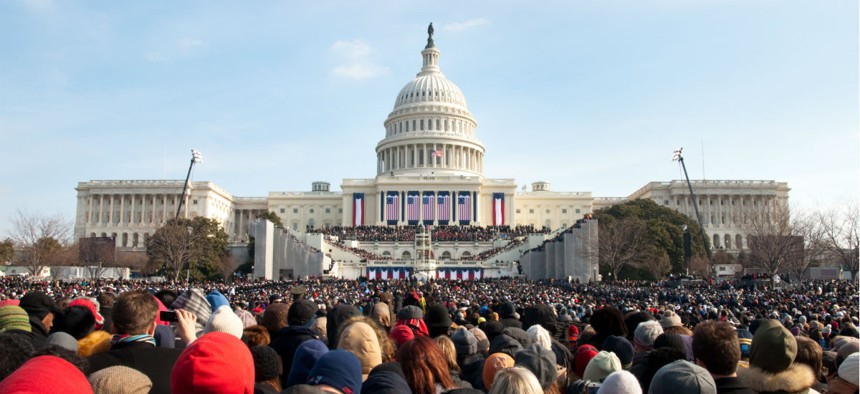
A crowd gathers for President Obama's first inauguration. Ryan Rodrick Beiler / Shutterstock.com
With Presidential Field Still Narrowing, GSA Prepares for Transition
Mary Gibert leads team picking securable D.C. office space.
Under a 2010 law, White House staff, key agencies and major “eligible” presidential candidates are encouraged to ignore opponents who call them presumptuous and proceed months or even years before a presidential election to set up transition staffs and offices.
In this cycle, the spadework has fallen to Mary Gibert, who since March 2015 has been director of presidential transition at the General Services Administration. (Gibert came over from the Pension Benefit Guaranty Corp., where she was deputy director in its Workplace Solutions Department.)
Her team’s current task, she told Government Executive, is to book pre-election office space for eligible candidates, the president-elect, the outgoing president and an inauguration staff.
Two space choices have been made public so far, the first being 90,000 square feet at GSA’s own remodeled building at 18 F Street N.W., for which Congress has approved improvements to house 500 staffers of the next presidential transition team, as reported by Washington Business Journal. Another space near the White House also was booked.
Future updates are to be posted at a GSA transition portal.
The selection of space can be expensive in today’s market, which is why GSA looks first for rooms usually occupied by other agencies that are temporarily vacant. The agency must plan furnishings and communications equipment and also work closely with the Secret Service and the Federal Protective Service to assure building security at the presidential level, as noted by one of Gibert’s predecessors, Gail Lovelace, quoted in Martha Joynt Kumar’s 2015 book “Before the Oath: How George W. Bush and Barack Obama Managed a Transfer of Power.”
Lovelace began planning for a hypothetical 2012 transition from Barack Obama to a Republican as early as 2009, and booked the first office space for transition and inauguration staff in June 2011---16 months before the nation knew that Mitt Romney would not be moving into the Oval Office.
The timing is fluid, as GSA staff must plan space often without knowing the major party candidates until around the summer conventions. But the purpose of the 2010 Pre-Election Presidential Transition Act was to facilitate funding and early action from both major party contenders, as well as any third-party candidate qualified as eligible.
Criterion for eligibility are laid out in the law to include, besides the major nominees, any other candidate determined to be “among the principal contenders” who is recognized in national opinion polls as “realistically considered,” recognized by national organizations (including the Commission on Presidential Debates), and who has qualified to appear on the ballots of a sufficient number of states so “that the total number of electors appointed in those states is greater than 50 percent of the total number of electors appointed in all of the states.”
Some in Congress argue that GSA’s role in the transition needs further strengthening and clarification. The 2015 Presidential Transitions Improvements Act, sponsored Ron Johnson, R-Wis., and ranking member Tom Carper, D-Del., would ensure that a senior-level, White House-led interagency transition council is in place at least six months before Election Day, and that a standing, working-level interagency group is set up to develop an integrated strategy for transitions. The bill would also expand training for executives and require the GSA to designate a senior career appointee to serve as the Federal Transition Coordinator to coordinate transition planning across agencies. This elevated official would ensure that agencies comply with all statutory requirements relating to transition planning and reporting, each designating their own senior career employee to oversee transition activities.
That bipartisan bill passed the Senate last July but awaits action in the House. Were the House to act before this summer, the Johnson-Carper bill’s deadlines would likely allow the GSA and other agencies to put it in effect for this year’s election and transition.
(Image via Ryan Rodrick Beiler / Shutterstock.com)







